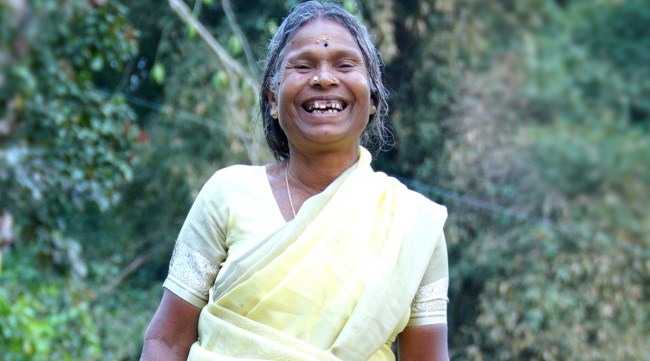Opinion Why it matters that a tribal singer won a National Award
Mrudula Devi S writes: The honour for Nanjiamma, an Irula folk singer, is an honour for her marginalised community and a challenge to the hegemony of elite culture.
 Mrudula Devi S writes: Nanjiamma, the singer, is not the creation of the director Sachidanandan, but the product of a socio-cultural revolution that has been going on for ages. (Image: Wikipedia)
Mrudula Devi S writes: Nanjiamma, the singer, is not the creation of the director Sachidanandan, but the product of a socio-cultural revolution that has been going on for ages. (Image: Wikipedia) Written by Mrudula Devi S
Even the indigenous people of Australia wept when South African reggae musician and Rastafarian Lucky Philip Dube died. An elderly Australian wrote on a tree, “You will always be in our hearts with your music “. There have been times before when the songs of non-Caucasian people have taken over the world. Field holler songs and work songs were the defence songs of African slaves, cherished by later generations. ‘Kalakkatha’, the song in the Irula language sung by Nanjiamma, a tribal woman, for the movie Ayyappanum Koshiyum, is one such song which has crossed national and cultural boundaries and thrilled the world. Its global flavours enabled it to resonate with the heartbeats of music lovers around the world.
The story of Ayyappanum Koshiyum revolves around the conflict between the rich ex-havildar Koshi Kurien and Attappadi sub-inspector Ayyappan Nair, the son of a tribal woman. Since the film is set in a tribal setting, it was director K R Sachidanandan’s decision to have an Adivasi singer perform a song in an Adivasi language, which brought singer Nanjiamma into the film. The film’s title song ‘Kalakkatha’, composed by Jakes Bejoy, attained popularity after its release on YouTube, receiving more than 10 million views in a month. It won Nanjiamma, who belongs to an Irula tribe, the National Award for Best Female Singer and the Kerala State Special Jury Award.
Irula is a Dravidian language spoken by the Irula tribes who inhabit the area of the Nilgiri mountains, in the states of Tamilnadu, Kerala and Karnataka. The Irula language is rich in its customs, legends and folk music. Even before vehicles like buses and cars reached Attapadi, a tribal block in Kerala’s Palakkad district, the Irula people could see planes flying overhead. Nanjiamma’s song is about an Irula mother, coaxing her child to eat rice by telling him that she will show him a plane.
Nanjiamma, the singer, is not the creation of the director Sachidanandan, but the product of a socio-cultural revolution that has been going on for ages. She made her singing and acting debut in the film Aggedu Nayaga (2015), directed by Sindhu Sajan, a teacher and human rights activist. She has made great contributions to Kerala as a folk artist in the Azad Kala Sangam of the tribal artist Palani Swamy for a long time.
Historical studies that have emerged from among indigenous communities have become harbingers of significant changes in the socio-cultural world. Talents such as MN Thankappan, CJ Kuttappan, Mariamma John (Mariamma Chedathi) and Kalabhavan Mani brought about significant changes to the folk culture in Kerala. Folk artists like PS Banerjee and Mathai Sunil have made such forms more popular. These songs were heard everywhere in Kerala through music collections which had, until the 1980s, ignored tribal art forms.
It has become clear to the mainstream that there is a large indigenous population beyond the elite, orthodox Malayalam language and temple culture. It is obvious that any record of Kerala‘s “socio-cultural-political history” will not be complete if the ideas put forward by the indigenous communities are ignored.
Art is an ever-present feature of tribal life: While working and resting, for ceremonies such as birth and death. Nanjiamma became a folk singer because she belonged to a group where music is inherent. Her entry into the caste hegemonical headquarters of Malayalam cinema is a noteworthy one.
Even today, tribal women are among the most vulnerable to abuse. The fact that Nanjiamma is a woman from a class that has no privilege should be clearly marked. When Nanjiamma wins a national award, it represents her community too – a community that has no authority on the land. Due to a lack of authority over the land, those groups have not been able to rise socially, economically and culturally. Therefore, the cultural awakening of that community through the award won by Nanjiamma is remarkable. She is now raising her voice for not getting the land she deserves despite being a National Award winner. No other National Award winner has faced such a situation.
Kerala generally gives importance to orthodox temple arts and classical songs. Asia’s largest arts festival, the School Arts Festival promotes trained students with the support of teachers. Students from Dalit and tribal communities, who do not have the financial means to study under a guru for many years, are often left behind in such competitions. Winners from the School Arts Festival make it into the movies where classical music is promoted. Therefore, there is a natural exclusion of the communities from less privileged communities from these fields of art. They are forced to become culturally invisible while being visible physically. The national award won by Nanjiamma is an inspiration for many such people.
Music has no language, no barriers. It can bridge the gap between east, west, north and south, and conquer the hearts of all of humanity. All music is born from the earth. Technique and practice came later. Nanjiamma’s song went to our hearts because of its uniqueness, and not because of its technique. Let us also sing it with our hearts
(The writer is a Dalit activist and lyricist who wrote a Paluva language song for the Malayalam film The Great Indian Kitchen)




